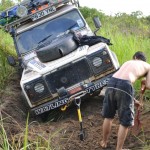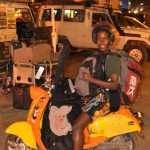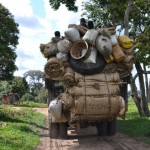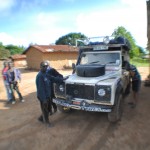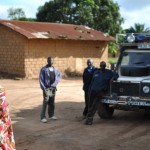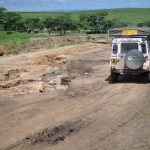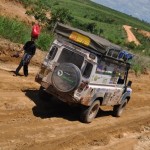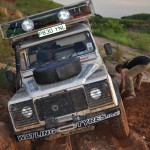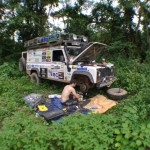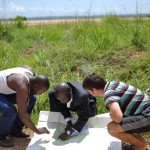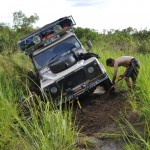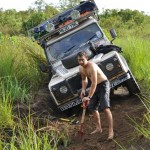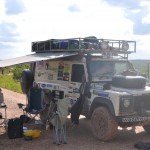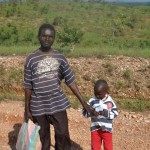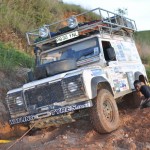With our Angolan visas sorted, we made an early morning dash to get out of Luanda before traffic took hold and made steady progress out of the North of the city on the 400 mile journey to Kinshasa.
We had chosen the most direct route, a toss up between 200 miles of additional travel on tarmac or an 80 mile stretch of road the map showed as ‘improved’. Undoubtedly it would not be tarmac, but gravel roads sometimes can allow 60 mph, whereas other times they allow no more than 10 mph. It was a gamble; we were very much going into the unknown.
It took us 3hours to negotiate the dusty, dirty suburbs, following the erratic blue and white minibuses overtaking the huge lines of traffic on the bumpy rutted mud beside the tarmac. We dodged the never ending stream of street sellers who wander between the queuing cars, passing opportunities to buy ice cold water, fruit, meat kebabs, toilet seats, plastic guitars, radios, Mona Lisa portraits and sunglasses. The choice is simply mind-boggling, has anyone ever left the house and then realised they need a new toilet seat whilst sitting at the traffic lights?!
Despite the stories of violent crime in and around Luanda, whilst sitting in traffic where people lined the streets, not once did we feel in danger. Smiles were on display for us and waving was the order of the day. Mercifully, the police didn’t seem that interested in us, only pulling us over once all morning.
The i-pod hit the notes, we dodged the potholes and by midday we had cleared the Angolan capital, with an open road ahead. We left the Atlantic coast and headed inland, climbing through the Angolan interior, a reassuringly steady plume of black smoke emanating from the exhaust. Thankfully, after all the work completed in South Africa, the temperature gauge didn’t budge once and we sat back aware that we had a lot of work to do – working our way through the 20 cans of Coke which we had stocked up on.
It’s always a nice feeling leaving somewhere fully stocked and clean. We had showered, filled up the diesel jerry cans, water containers, had lots of food, petrol for the cooker and were ready to head into the unknown.
On good tarmac road we clocked up the distance and before we knew it had covered 150 miles. Just as the sun began to set and we began looking for a disused roadside quarry or somewhere similar to sleep, a strange vibration from the car grabbed our attention.
It was suspected to be a wheel bearing which had some wear on it in Luanda and upon closer inspection that evening we decided the bearing was on its way out. The decision had to be taken of how to approach it – throw a new bearing in and limp the car to somewhere clean and flat to change everything or just crack on where we had decided to camp in a muddy, uneven, cane field. Eventually we decided on the latter, so we had a late start the following day after having changed the wheel bearing, trimming a tree branch to make a nice wooden block with which to hammer in the new racers and oil seals.
The further inland we went, the worse the roads got and the blasting along at 50 mph was quickly a thing of the past. We averaged 30 mph for the rest of the day, dodging potholes, smoky trucks and torrential downpours seriously affecting vision!
We ticked off the villages against the names on the large scale Michelin map, our Tracks 4Africa GPS programme offering no information for this part of the world. As we approached the border, the names on the map disappeared and we had to resort to asking directions in broken French/Portugeuse and make judgements based on the trusty compass which had taken us round numerous Scouting hikes in the Chilterns many, many years previously. We hoped compasses didn’t deteriorate with age…
After another night of bush camping, just 30km from the border we found ourselves in the interestingly named transit town of Marquela de Zombo. To be on the safe side we decided to fill up one extra 20 litre diesel jerry can before striking out for the border.
Carl sat and watched as a man in overalls picked up a plastic yellow container and proceeded to empty its diesel-ly contents liberally all over our jerry can, the floor and most of Toms arms. Apparently some fluid did go into the jerry can, at which point the attendant started all over again with the next container full. Several minutes and several containers later the man was at the car window demanding payment, whilst Tom tried in vain to wash his arms down and Carl was fighting off the hoard of apparently wealthy beggars which has appeared.
This is indicative of an interesting attitude that exists in Africa; in the West it would be seen as demeaning or unethical to beg for money unless one really needs it. But in Africa, we’ve had countless smartly dressed young guys ask for money. Girls rarely ask, most girls scurry away in fits of giggles or embarrassment at a mere ‘Hello’ from white chaps like us.
Maybe most importantly, who ever drove through towns in the middle of nowhere like this just simply handing out money?! How do these habits start?
We got talking to a friendly local businessman who advised us to avoid the slightly larger border crossing at Banza Sosso, because a bridge was down and the road was impassable. We tossed up the value of this information, as we’ve been told similar things in other countries for it to be proved completely false but, deciding that he seemed a trustworthy chap, we took his advice and headed East, before looking for an alternative road North.
Either side of the dirt road, one metre deep ruts from the rain and we trundled along on the relatively smooth dirt, constantly climbing or descending through the green rolling hills.
The road passed through many small villages, the kids seeing us from a distance and working themselves into a frenzy by the time we drew level. By this point the ‘road’ had actually turned into a footpath and motorbike trail; visible tyre tracks suggested that larger vehicles had been down the tracks relatively recently but there certainly hadn’t been many.
As well as the running, jumping and screaming children, we negotiated a route past goats and chickens, pausing to deliberate the direction at each junction which presented itself. After asking countless people for ‘le frontiere’ we were directed down what looked like a small track to a house, with grass and reeds rising above the bonnet as we pushed through the vivid green vegetation.
With one person walking in front of the car to check for nasty hidden tree-stumps, we made slow progress. Having successfully negotiated several ‘bridges’, consisting of makeshift wooden planks carefully organised to get the car over fast flowing streams, we came across an apparently abandoned old manor house with two UN Refugee Programme tents outside. This was the border, and as we pulled up the heavens opened.
Tom ran into the building to complete the formalities, whilst Carl parked under a thick tree to reduce the amount of water which would inevitably make its way into the cab.
Too late, the Landys sidelights decided to switch themselves on and would remain on for the next two days until everything dried. Also seeking shelter under the tree were an Angolan soldier and policeman, to whom Carl spent the following 20 minutes explaining that they could not have the map they were pointing at, or his watch, or Toms knife, or our bottles of water.
Even with the window wound up, the pained, begging face continued at the window. Inside the remnants of the house, Tom dodged the rain coming through the holes ceiling, as well as suggestions that the official should be given ‘cold drink’ as we stamped out of Angola.
To prevent a further soaking, Carl drew up to the door of the house and Tom flung himself through the car door along with the all-important document wallet (dear God, we hope its waterproof!) and we plodded on, inching our way down the mud track which was now submerged below a small stream, the windows and windscreen steaming up despite the best efforts of the blower.
We covered 500 metres through the now Biblically strong downpour, cresting a steep hill before finding ourselves in a large grass field, the track becoming less and less used as we proceeded. We were now in ‘no man’s land’, between Angola and The Democratic Republic of Congo.
We needed to reach the DRC side before border-post closing time for the day, in order to prevent a large time-lapse between stamping out of Angola and into DRC. As if on cue, the right hand side of the car sunk into apparently solid ground and we were stuck. Chucking the Landy into low range we managed to move forward a bit, then lurched even further down on the right. With only the seat belt preventing the passenger from becoming one with the driver, we figured it was time to have a look.
Aah, first problem, we’re at such an angle the drivers door won’t open. Ok, clamber out the passenger’s door and the left rear wheel is off the floor, the diffs are well and truly buried in the dirt and the road has effectively collapsed on the right side, leaving the right wheels in a metre deep rut, the sides of which are all that is keeping the car up-right.
Within seconds of being out of the car we were soaked to the skin. So it was down to just shorts and sandals and time to crack out the spades. The first concern was to get the car on more of an even keel and then make a decision about moving forwards.
So the torrent coming down the hill and flowing through the ditch where the wheels were was dammed and re-routed, allowing us to see how deep we were. We dug large holes in front of the left wheels and removed as much of the resistance to the other side but the car wouldn’t move as there wasn’t enough traction for the left wheels.
Even with the diff-lock engaged, the power was simply escaping through the left rear and left front wheels. So out came the winch gear and we dug in the land anchor some 15 metres infront of the car, as there was nothing else to winch off of.
As the winch groaned and pulled us forward, inch by inch the car immediately righted itself as the wheels fell into our carefully crafted holes. However, as we continued forward, it began to lean back off to the right as the bank continued to collapse. After trying a few different angles and ideas, we resigned ourselves to fact that we would have to dig out everything in the two metres ahead of us.
Thankfully the sun came out and dried us somewhat as we toiled for the following two hours, before dropping rapidly through the sky and with it went the number of minutes we had before we would be pitched into darkness.
Finally our track was ready and through a combination of winch and driving we managed to get the car 20 metres further, through a small river which all the water had been running towards and onto solid ground. It had only taken 3 hours and had been our first taste of getting the car ‘properly stuck’, far worse than what we had experienced in the sand in Sudan.
With no-one around we camped near the road, readying our excuses for the Congolese the following day. By 9 pm, we were in bed, taking refuge in the mosquito nets, exhausted after a good bout of manual labour.
We were woken by a passer by shouting ‘amigo, amigo’ to us at 5am. Ignoring him only worked to an extent. This chap was clearly fascinated enough by this sticker -filled automobile with a tent on its roof to sit beside the car until 8am when we got up. By the time we had had breakfasted and were readying to leave, the trees had clearly been whispering of us, as 3 others had arrived to join in the staring.
We continued along the track towards the Congolese border post where a policeman asked for a lift and, thinking he might be connected with the border, we thought this could be a good idea so welcomed him in and then began to crawl our way down a hugely rutted, steep sideslope.
Driving was tough, a foot either side could quite easily have rolled the car or got it stuck to a degree that hours of digging would be required. On top of this the policeman constantly tried to advise on line choice, whilst a couple of the earlier hangers-on had taken it upon themselves to run in front of the car directing this way and that. Such was the distraction that eventually one of us got out, ushering the others out of the way and allowing us to pick our own line.
Unfortunately the car didn’t ride it out completely unscathed, a nasty bend in the rear step and the great lurching appearing to throw some residual crap in the fuel tank into the path of the fuel pickup of the tank, resulting in us having to blow out the fuel line (again!).
Just as we hoped, as we arrived at the border post, the policeman with us strode in and took up office at the ‘Director General de l’Immigration’ desk and started processing our paperwork without any hassle. After an hour of stamping, chatting and suggestions that, “It is gooood iiif you tek eh Congolese wife to Ingland wit you” (just smile and nod until he finishes the stamping), we were in Congo, our 23rd country since the UK.
And as we trundled away from the border post, we looked around at the vastly different scenery of Congo. As we’ve often found whilst crossing borders, within just a few miles a landscape can change and this was no different, immediately immersing us in apparently endless rolling green hills and thick vegetation.
The road continued to prove slow going, as we never hit more than 10 mph and we passed countless huts, children, chickens and goats always on the go, whilst the women all seemed to sit in their respective doorways, staring into space. The men were rarely around, most likely toiling in the fields.
As the end of the first day approached, the track skirted the edge of a village. We could see a sloop of mud stretching way before us, with no immediate alternative. Engaging diff-lock, we ploughed through.
Although we cleared the first patch, we were soon stuck. The entire village truned out to see what had become of us, calling to others farther afield to come and watch the white men dig their car out. Again, we got her free quite quickly and continued on past the goups of huts secreted beneath he trees.
Then came the big crossing, a long, low pool of mud. We crossed our fingers and drove in. But not out.
The Landy was firmly stuck, up to the axles in a foul smelling mud, the back submerged up to the rear door and the front wheels spinning uselessly. We were, quite literally, in deeper shit than Julian Assange.
We hooked up the winch to the land anchor, but the resistance from the mud was too great; the winch couldn’t pull us out. Further to this, the anchor kept slicing through the earth. We tried extending the winch rope and digging the anchor deeper, but to no avail.
At this point, the high banks either side of the mud pool were lined with faces, all watching the action. After an hour or so, we began digging. Trying to remove some of the mud from the back wheels and provide traction to the front wheels with trackmats, we dug into the night.
Our observers, seeing that we wouldn’t be free for some time, began to help. One by one, people volunteered to dig, taking the spades from our exhausted hands and scooping the mud into buckets in an attempt to empty the entire pit of the cloying clods.
For several hours, we dug, winched, hoisted, dug, jacked and dug again. At least three or four of our Congolese friends were now filthy, covered head to toe in mud. Thunderclouds gathered in the night sky and, away to the north, lightning strikes bounced between ground and cloud.
The rain, when it came, was mercifully light, but compounded our need to get out of the bog quickly. The rain wouldn’t hold off for long. It did clear the banks of observers, as the villagers ran indoors seeking shelter.
Eventually, we managed to get the trackmats under the front wheels. Then, with the aid of strops, ropes and a pulley-block, we managed to rig up a fixed winchline from two trees. The boys dug more mud and the rain eased.
Finally, we were ready to try again. The truck fired and the winch rope strained against the drum. For a few moments, nothing. Then, the spinning front wheels gripped! The truck moved all of two inches forward, wheels achingly grasping for more purchase. The winch hooked up again and, with the muds hold on the back axle now broken, we were free!
Never before have either of us heard an entire village rejoice, but for the next few moments, all around us jumped and whooped with delight, as did we, at having finally broken free.
Those who had gone to bed came back outside to see, those who had been with us were all smiles and, despite the language barrier, we all congratulated and thanked one another.
Setting up the tent there and then, in the road outside the village no more than 10 metres from the mudhole, we made our excuses to the crowd and climbed up into the tent, covered in mud. The crowd dispersed as the heavens finally opened. As the rain fell, we ran out and took a very cold but very welcome shower. The villages must have though we were bonkers.
As we set off the next morning, the words of one of the villagers ran in our ears, “Le rue c’est impracticable pour 7 kilometre Monsieur. Impracticable.” A gaggle of young men and boys jogged after the can for the next three miles, digging when we stopped to rest. We never asked them to, they just came with.
The road snaked between the hills, cutting through the steeper slopes and forming gulley’s through which the rain was naturally encouraged to flow, thus deepening and aggravating the ruts and grooves.
Eventually, the we stopped for lunch, putting up the awning to provide some shelter from the dazzling sun and 40 degree heat. The boys gathered round as we passed out cups of sweet tea and looked for our few remaining biscuits as a way of saying thank you for all their hard digging.
Meantime, one of the other chaps disappeared off, returning half an hour later with pockets full and shirt stuffed with mangoes. He had simply wandered off down the hill and plucked twenty or so of the ripe, gold and green fruit from a tree. Lunch for everyone – brilliant.
As we sat back to read a book or two and rest until the heat of the day had abated, the boys waved goodbye and began the long walk back to the village. Apart from one of the smaller boys trying to half-inch Toms blue shorts (Seriously, considering the amount they have been washed recently, not a good idea – Tom), the boys asked little in return for their labours.
Progress was still slow. As the road levelled, the ground underfoot began to worsen, as the hard but uneven sand-baked earth gave way to sand. Despite this, we kept going, only getting really stuck one more time.
This time, again getting stuck near nightfall, we were ably assisted by another passer-by, Nlolo. Again, the car pitched into soft, soft sand and lost traction at the rear. Lots of digging and winching later, we were out and decided to offer Nlolo some dinner, as recompense for him digging with us into the night.
The following day, another five or six miles down the road, the track levelled. Finally, we were on the ‘better’ road. We made progress through larger and larger villages, the population increasing all the while. Motorbikes become more frequent and we even saw our first truck (a Toyota Hilux, ‘natch).
Throughout our time on the really rough roads, we used winch countless times, found the ease of our land anchor/plough great and the heavy duty tracmats saved us further digging almost each time. We’ve lugged these items round 3/4of Africa, so it was brilliant to see how good they were when they were needed!
The road got better and better and the villagers in each of the outlying settlements leapt up as we approached and guided us through their own little patch of difficult ground around the houses.
Eventually we reached the market town of Kimpemba, the road passing directly through rich colourful markets with all kinds of exotic foods around, as well as the staple items of potato, onion, tomato, garlic just as we have seen women sitting by the road with in every single country in Africa so far. Such is the fertility of the land in Congo that countless times we found the road littered by fruit from the surrounding trees, creating amazing smells and sounds as the car rides over a carpet of mangos.
Finally, after six days, during which we covered just over 100 kms, we reached the tarmac road at Kitanu. Turning right, we picked up speed and forged a path through the chaotic countryside traffic towards Kinshasa.
The road snakes between the hills, cresting the rises with views over the lush, green land whilst the reddening evening light slipping quickly behind the peaks.
Before we knew it darkness had fallen and as always seems to be the case with us whilst night driving, it started raining. After 6 days of having the road to ourselves and just waving villagers for company, we were thrust right back into the cauldron that can be African road travel with unbelievable overtaking, a lack of any lights and police checkpoints every few miles.
After avoiding an artic which had swerved off the road to prevent a head-on accident the lunatic in front of us, we wondered if we had seen such bad driving, at such speed anywhere else in Africa. For example, the driving in Ethiopia is terrible, but generally everything happens at a slower pace as all the vehicles are much older. Here however, the articulated lorries were doing almost 60mph. We think this may well be the worst.
The police checkpoints were also different. Being the end of the day, we had heard we might face drunken cops and sure enough the first chap to stop us had bright red eyes and could barely put a sentence together. Pretending we couldn’t understand a word he was saying in French (actually not that far from the truth..) we tried to wear down his patience by speaking English as fast as we could in return. He quickly tired and simply resorted to ‘ok give me money’. Explaining our need to get to Kinshasa promptly, we put it into 1st and pulled away, then realising that our car was virtually the only reason he had still be upright whilst speaking to us!
Each checkpoint was the same, police simply saying ‘bonjour, give me money/beer/cold drink’, for-going the small talk and irrespective of whether a colleague was within hearing distance. Realising the ‘playing dumb’ replies seem to work (some of us are naturally good at this), we kept them up and even managed to get through a paege without paying. That said, we still don’t know if it was genuine!
So after taking 6 days to cover 100km, that evening we then took just 2hours to cover the same distance on the tar.
Kinshasa itself was as busy as we had expected. Being the largest and most populated city in Francophone Africa it sprawls apparently endlessly, taking us over 1 hour to make our way into the centre. At all times of the day on the pavement and in the road are an incessant stream of street sellers, never giving you a chance to relax. The rickety taxis squek their way past, UN Landcruisers push their way through the traffic and Police are at every junction. People speak French everywhere and the clothing is bright and garish, but at the same time traditional and refreshing.
Looking along the main boulevard, with dark smog from pollution and tall unattractive buildings, it screams ‘3rd world’. Just like Addis, it’s a messy, dirty, hassling, entertaining, interesting and lovable place.
We are staying at a Christian church St Annes, who kindly allow camping in the carpark free of charge, and from here we can see the huge brown expanse that is the Congo river. Just a few kilometres downstream you can see the river narrow to 2km, the middle of which is filled with trees and branches from the rainforest upstream. As the river narrows, rapids fire up, waves 10metres tall in the centre of the river.
Since arriving we’ve been enjoying the variety of cuisine that you just can’t get in the countryside, arranging new passports, Brazzaville visas and giving the car some TLC. After the couple of weeks we’ve had, fairly menial tasks but all have to be done!
Plan now is to take the ferry over the Congo river and push on Northwards with the aim of having Christmas on the beach in Gabon. Until then, festive greetings to you all.
As a final point, it has come to our attention that the Paypal icon has not been functioning for the last month. However it is definitely back ONLINE so, as the season of goodwill is upon us, any help towards our fundraising goal will be much appreciated.




